by James Lamkin
The Communion Table is an awakening place.
Sometimes, the wake-up call comes softly, like the huddled whispers of a Maundy Thursday foot washing. Sometimes, it is more startling—like seeing my own reflection in the chalice. Sometimes, the call to awaken echoes in the well-worn words of us latecomers to the story already in progress: “Joining our voices with all the company of heaven….”
The Bible, too, is big on awakening. From the prophet’s cry, to the psalmist’s plea, to Jesus’ one request of the drowsy disciples in the garden, to the epistle’s loud alarm: Sleeper awake; and while you’re at it, stay awake!
My prayer always is to leave the Lord’s Table more woke than I arrived. That doesn’t always happen; but I do know that awakening is not a one-and-done. It is a rinse/repeat.
World Communion Sunday is coming—a day we see the Lord’s Supper through a wide-angle lens. We awaken to the gifts and griefs of God’s people around the globe.
An awakening happened for me one night at the altar table of St. Margaret’s Episcopal Church in Washington, DC. Its century-old Gothic Revival windows and walls, just a block from Dupont Circle, served as a witness. The choir filled the loft. Two hundred folk sat in the nave. A midsummer’s night dream way back in 1995.
I was there to preach to Dignity Washington: A Community of Gay and Lesbian Catholics, Their Families and Friends. I was there because of two Alliance of Baptists congregations: Northminster Church and Ravensworth Baptist.
For a few years before, Northminster in Monroe, LA, had been busy wooing me back toward the pastorate. Then in 1992, Liz and I hoisted a sail, and the wind of the Alliance caught it and carried us to Ravensworth in Annandale, VA.
“How wide is God’s table?” had long been a part of the church’s conversation. Back in the day (!), the question seemed to focus on LGBTQ persons and sexual orientation. Two years into my pastorate, it was time to invite the congregation to a four-part conversation on “The Church and Homosexuality.”
Carrie Karegeannes, our church marketing volunteer, regularly sent congregational news to the Washington Post for free publicity. At that time, the Post offered selective, no-cost advertising in their religion section. This meant that they never ever advertised any of our stuff! At least, not until this time. This time, the Post ran: Ravensworth Baptist Church Discusses Homosexuality.
Well, that did it! “I thought this was to be an inside-the-congregation conversation,” said one church member. “Not even Carlyle Marney touched that topic,” warned another. However, some Ravensworthers, like Carolyn Schirmer, said, “It’s time.”
In spite of the church’s anxiety, and mine, on a Wednesday night in October 1994, we all took a deep breath and began.
I don’t remember much of what I said. ‘Twas a vanilla recounting of the positions which The Church, Inc. had taken over the centuries. I concluded with the current wording of the choices facing most churches: Welcoming AND Affirming; or Welcoming BUT NOT Affirming. I closed my presentation the first evening by saying: “I begin with graceful welcoming. As I read the Gospels, that’s not optional.”
Mid-evening, I spotted an unfamiliar face. Young man. Suit and tie. Briefcase. Legal pad. He took copious notes; and at the end of the discussion he rose to speak. His name was Matthew. He was a lawyer (I thought of the lawyer in John 3, who showed-up at Jesus’ fireside chat).
A week later, a letter arrived from Matthew reiterating what he said that evening: “I wanted to write you to thank you and your congregation for taking the time to present such a sensitive and open discussion on such a controversial issue as homosexuality. As I expressed during my ‘testimonial,’ I was not anticipating the position that you had taken regarding gay men and women. I was sure that once again, a Baptist minister and congregation would be attacking the so-called ‘gay lifestyle.’ …To my surprise and delight I did not have to face an angry, hostile crowd. What’s more, I felt as welcome in your church as I do in my own. The people with whom I spoke were inquisitive, caring and generally open to a perspective different from their own. The old stereotype of Baptists as being closed-minded bigots was forever shattered in my mind.”
Later, another letter came. Matthew had, “cleared it with the liturgy committee,” to invite me to preach on the evening of June 11, 1995, at the church where he was a member: Dignity Washington.
Dignity Church (now DignityUSA) is a “Catholic organization for LGBTQIA+ ministry and advocacy.” Dignity Washington had landed at St. Margaret’s Episcopal after being ousted from St. Williams’s Chapel at Georgetown in 1987. (As a sidebar, only recently, January 22, 2025, did Bishop Wilton Gregory of the Archdiocese of Washington apologize to the members of Dignity Washington “for the Church’s alienation of them and others in the LGBTQ+ community for many decades.”) Wow.
So, I went. I preached. I used the same lectionary text and sermon from Ravensworth that morning. After the service, folk filed through the narthex. About one-in-four said the same thing: “It’s great to hear a good ole’ Baptist sermon (?) again. I used to be a Baptist; but I knew I couldn’t stay.”
I was awakened—aware that my small world had just widened. But, it did not happen in the narthex. It happened at the Table.
I had watched the faces of communicants, mostly men, walking up the aisle to receive the Eucharist. Some wore suits. Some wore Harley Davidson biker vests and jeans. Some wore boots; others, flip-flops. In other words, normal people. Real people.
Their faces stand-out in my memory. Their faces mirrored my own. They bore a hollowed-out kind of hope—yearning to hear the Spirit’s words which mattered the most: “You are my beloved.”
Throughout communion, the choir sang The Servant’s Song. You know the lyrics: “Pilgrims on a journey. Travelers on the road. We are here to help each other, walk the mile and bear the load.”
But what caught me off guard was another stanza, with its lullaby-like rise and fall: “When we sing to God in heaven, we will find such harmony….” The memory gives me chill bumps. Within one word, the choir branched from unison, into parts, as they stair-stepped into har-mo-ny. Their diversity of voices incarnated the lyrics; and my eyes filled with tears.
When I returned to Ravensworth, “that which I had seen and heard, declared I unto them.” After all, it was because of them that I was there.
A few years later, in 2006, long after I’d moved on, Ravensworth joined the Association of Welcoming and Affirming Baptists and claimed the gift they had stirred up in me and themselves, long ago.
I brought my awakening experience from Dignity and Ravensworth to another Alliance congregation: Northside Drive Baptist Church in Atlanta. Within a few years, Northside Drive also voted, “to be committed to openness and the equal inclusion and participation of all people, in all parts of the church, including its leadership.”
Since the World Communion Table can be such an awakening place, here is a benediction:
May…
we of this present moment in world history,
we who cluster ‘round small Sunday tables with a big sacred story,
we who have been asked by Christ to stay awake,
May…
we on this World Communion Sunday,
join our voices, not only with all the company of heaven,
but with all those all over the Earth.
May it be so.
Amen
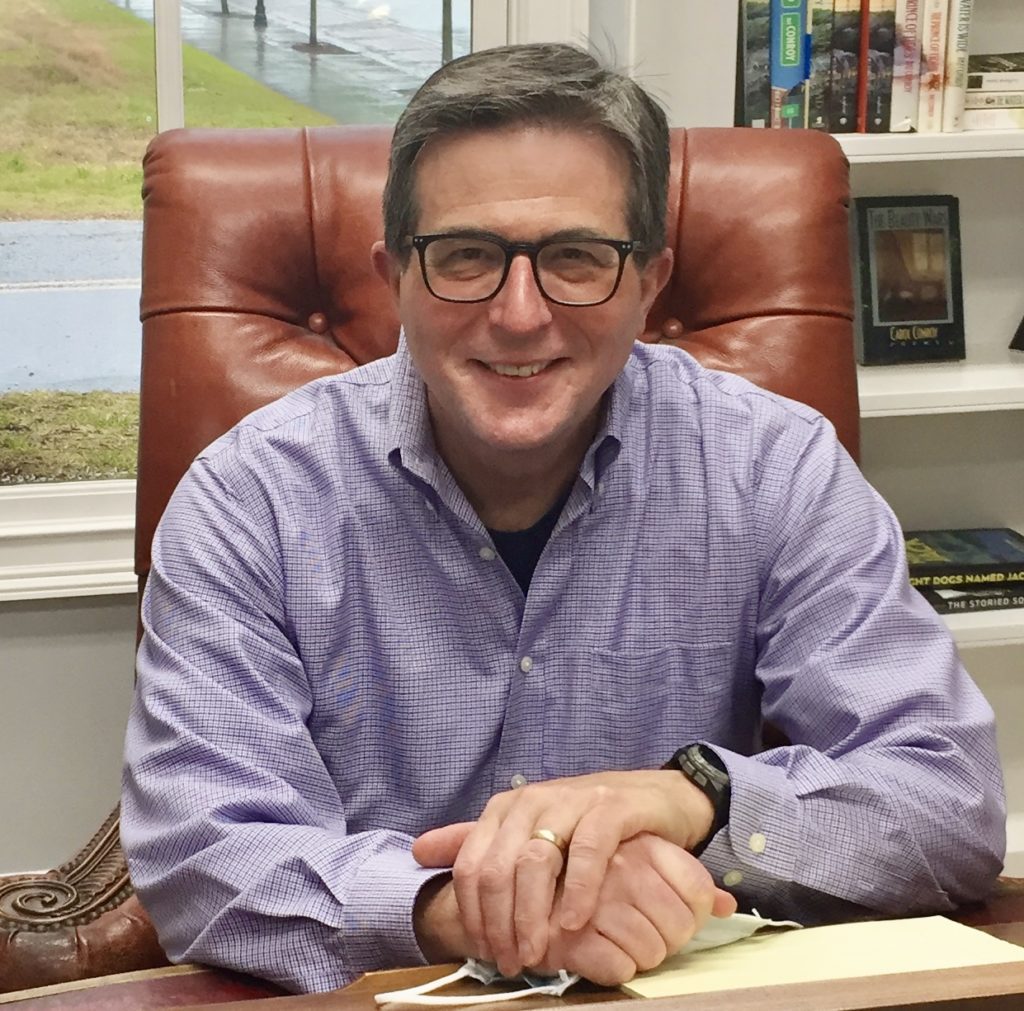
James Lamkin serves on the Board of Directors for the Alliance of Baptists and previously served two Alliance partner congregations, Ravensworth Baptist Church in Annandale, Virginia, and Northside Drive Baptist Church in Atlanta, Georgia. He now lives in Asheville, North Carolina with his wife, Liz Harris-Lamkin.

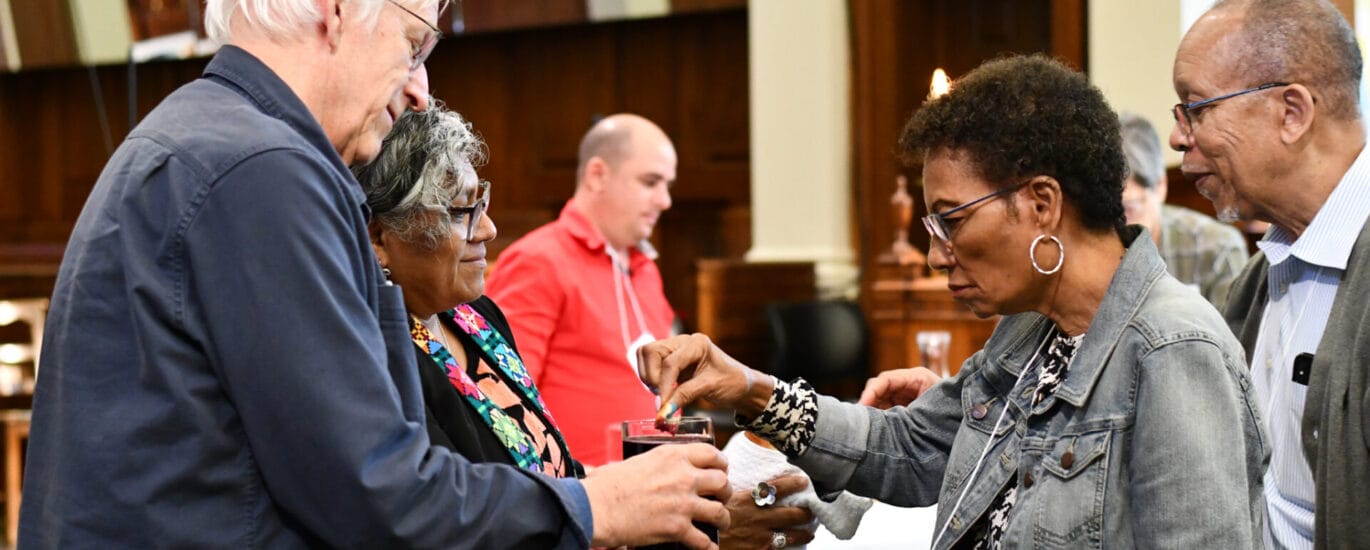
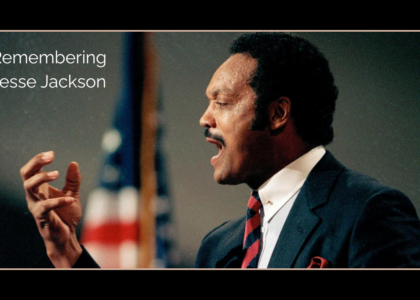
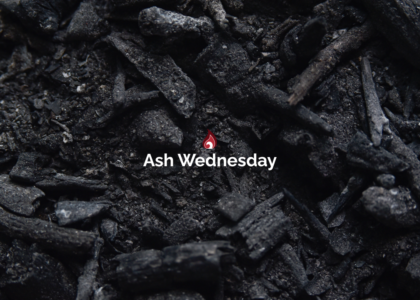
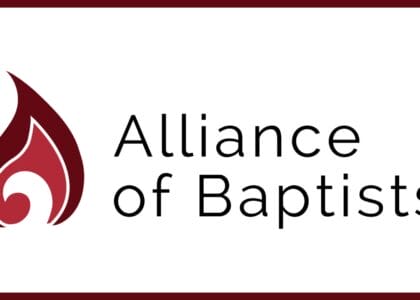
James, this is wonderful! It was a privilege to stand on your shoulders. I hope it didn’t hurt too much!
Steve Hyde
Ravensworth Pastor, 2001-2019
James, thanks so much. I am so glad that I was a part of that little bunch of renegades at Northminster who helped woo you back to the pastorate! Where you belonged! Preach on, brother. At the TABLE ALL are welcome!